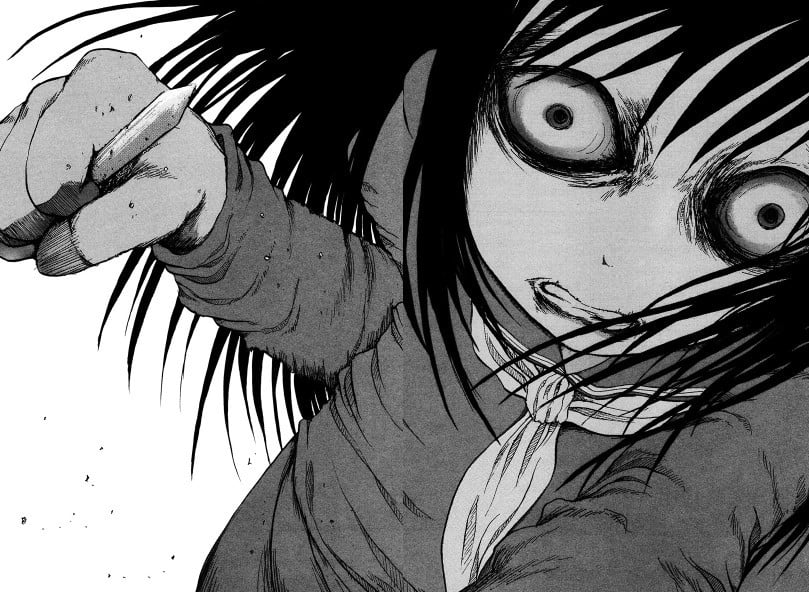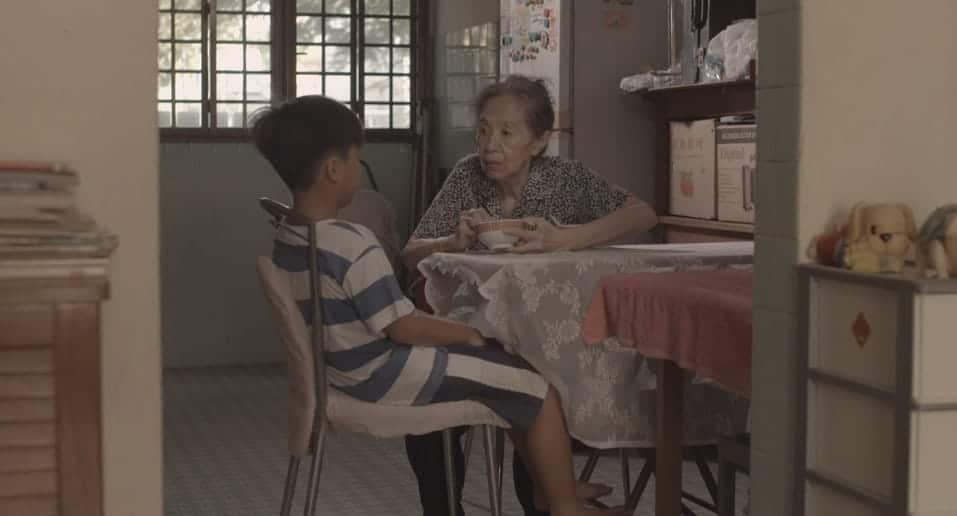Long before “Made in Hong Kong” (actually just four years, but the phrase sounded better), Fruit Chan made his debut with “Finale in Blood”, a film based on a popular classic of the Cantonese narrative singing art form Naamyam, originally set in the Qin Dynasty era. Fruit Chan transferred the story to post-war Hong Kong, retaining, though, the basic elements of the original story.
After a rather intense intro, where a woman is killed after falling from a window from a block of flats, we are introduced to the protagonist of the film, Cheng, a radio host mainly announcing food prices. His life seems to head to nowhere, but when an acquaintance of his asks him to deliver illegal western medicine to a man, his fate changes completely. A series of unfortunate events leads him drowning in the sea, but is eventually saved by a ghost hidden inside an umbrella. The ghost is soon revealed to be Fong Yan, the woman who died in the opening scene, who, after a rather awkward moment of becoming acquainted with her host, helps him with becoming the star announcer of a radio drama. The story he narrates, however, is Fong Yan's actual one, with the film presenting her tragic story through lengthy flashbacks.
Fong Yan was a rich girl who fell in love with Ma, a womanizer who constantly cheated her with a whore, eventually leading her to her demise, after a number of clashes with both him and the whore. Eventually, Fong Yan's past catches up with her and everyone involved is in danger.

Fruit Chan's abilities in unfolding the narrative in rather engaging ways was evident from this film, with him presenting the two arcs in the most entertaining fashion. The first one takes place in the present and lingers towards the comedy, particularly through the “adventures” of Cheng, a quirky individual who seems to be in constant trouble, with the secondary arc of the case with the smuggling adding much to this aspect.
However, it is the story of Fong Yan that steals the show, a tale of love, betrayal, but most of all vengeful jealousy, that has two women fighting for the love of a man who does not seem to care about anyone but himself. The dramatic essence of this arc that soon becomes violent is impressive in its presentation, with Chan drawing as much as possible from the excellent acting of his three actors, Ti Gwan Mei as Fong Yan, David Wu as Ma and Aoyama Chikako as the prostitute. The way the story builds up to the inevitable confrontation and the tragic ending is impressive, with the sequence with Fong Yan's death being the most memorable in the film.
The way the two arcs eventually join is also good, although not as much as the aforementioned arc, as the combination of comedy, drama and violence does not work 100%, particularly regarding the ghost-story aspect, which is a bit naive, although not to a point that faults the overall impression the film leaves. On the other hand, the use of the umbrella as a symbol and a tool of connection among the arcs works quite well, with its degrading condition mirroring the condition of the main characters.

Fruit Chan also makes the point that Hong Kong was and is (at least until the 90's) a male-dominated society, with women searching desperately for love from men who seem to be able to do whatever they want. This concept is presented not only through the main story, but also through another secondary one, involving Cheng and Sasa, a woman in love with him whom he continuously mistreats and exploits, although not in such a harsh fashion as Ma. The permeating sensualism (along with a number of brief scenes of nudity) also seems to point towards the fact that “this is a man's world”.
Peter Ngor Chi-Kwan and David Chung Chi-Man's cinematography is great, highlighting a number of different settings with equal artistry. Keung Chuen-Tak and David Chung Chi-Man's editing is great, with them inducing the film with a rather fast pace that resonates perfectly with the narrative, while their excellent placement of the flashbacks retains interest for the whole duration of the movie.
“Finale in Blood” has its faults, particularly regarding the mixing of the two arcs, but the ability in storytelling and the raw energy we watched in Chan's later films is definitely here.















